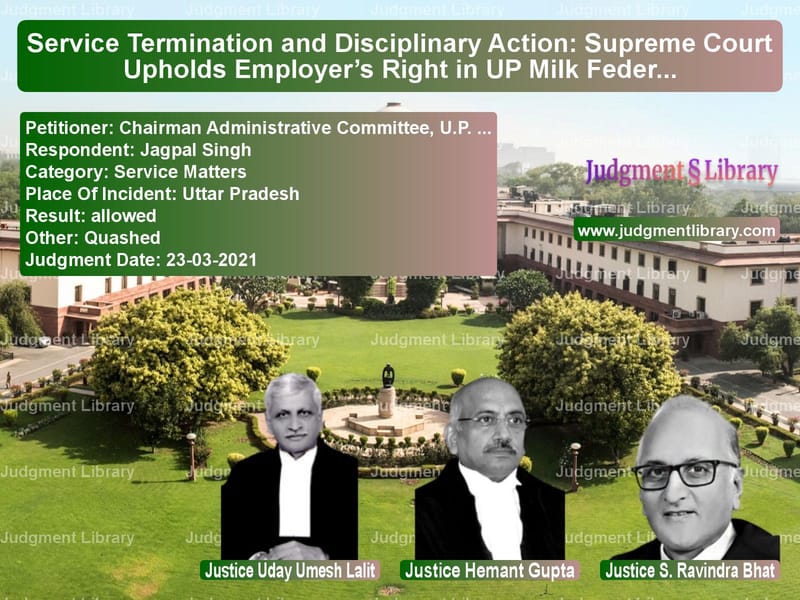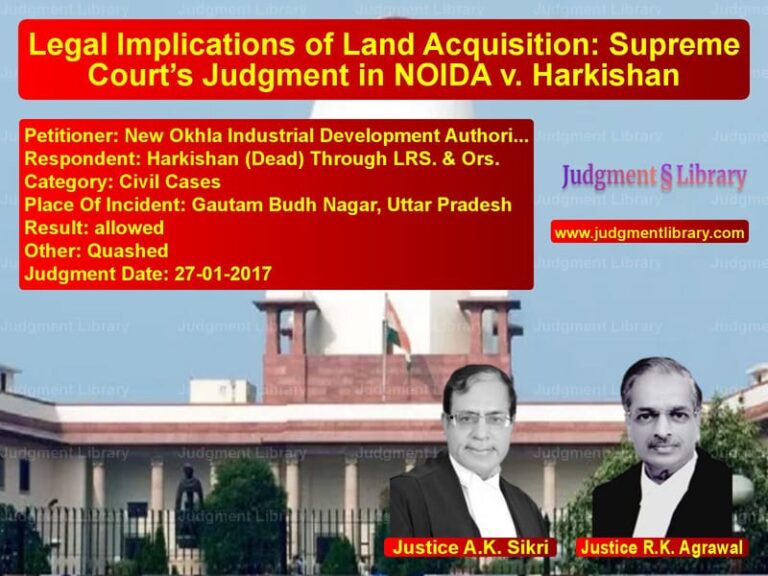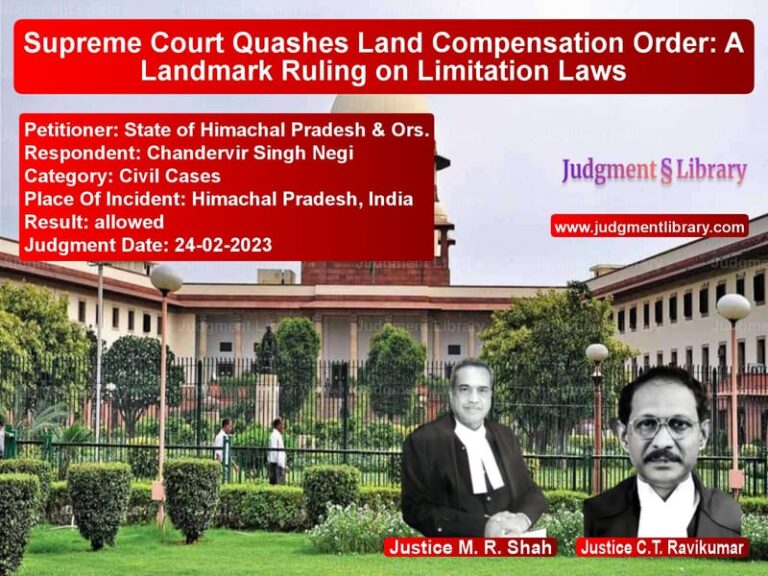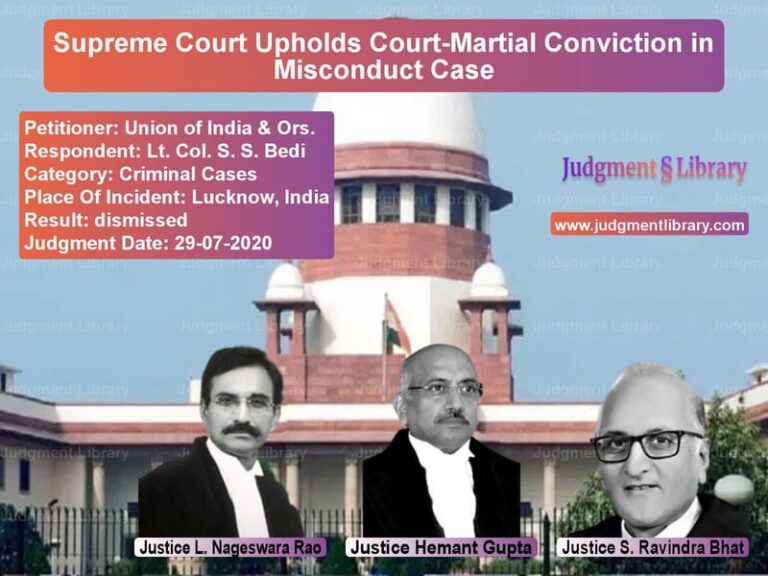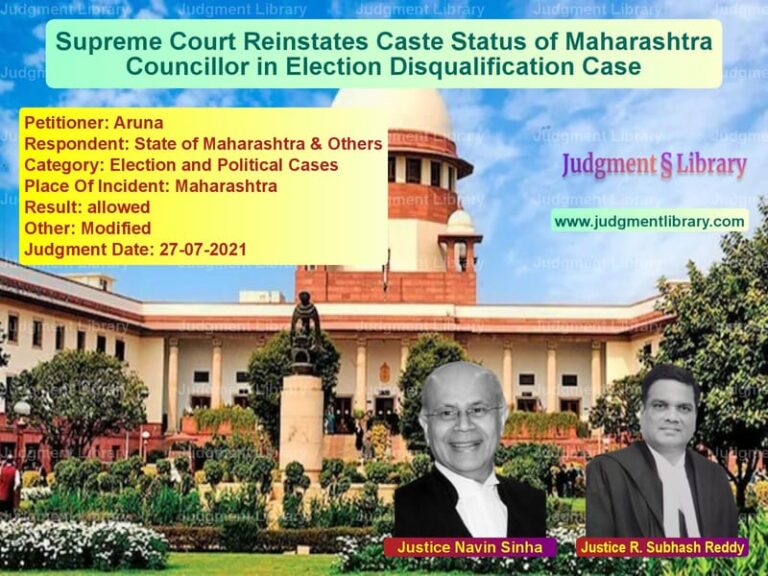Service Termination and Disciplinary Action: Supreme Court Upholds Employer’s Right in UP Milk Federation Case
The case of Chairman Administrative Committee, U.P. Milk Union & Dairy Federation Centralized Services vs. Jagpal Singh addresses key legal questions related to service termination, disciplinary control, and the application of service regulations in cooperative organizations. The Supreme Court examined whether the disciplinary action taken against the respondent, an employee accused of misconduct, was legally justified under the governing service rules.
Background of the Case
The dispute arose when the respondent, Jagpal Singh, was reverted to the minimum pay scale by an order dated 26.10.2018 for alleged misconduct while serving as a Manager Grade-III in the Centralized Services of the Uttar Pradesh Milk Union & Dairy Federation. The order also determined that his suspension period would be treated as time spent in service but without additional salary benefits beyond the subsistence and dearness allowances.
The charges against Jagpal Singh included allegations that he engaged in fraudulent activities involving the weight measurement of milk tankers. According to the inquiry report, an additional hidden chamber in the tankers was used to manipulate weight calculations, causing financial losses to the Federation.
Read also: https://judgmentlibrary.com/esi-act-interpretation-supreme-court-ruling-on-conveyance-allowance/
Legal Challenge Before the High Court
Jagpal Singh challenged the punishment order before the Allahabad High Court, contending that the disciplinary action was taken without due process. The High Court’s Single Bench quashed the order, citing undue haste in its issuance just four days before the respondent’s retirement and lack of proper prior approval under Regulation 87 of the Service Regulations.
The Division Bench of the High Court upheld the Single Bench’s ruling, finding that the punishment was granted without following the prescribed legal framework. The employer then appealed to the Supreme Court.
Key Issues Before the Supreme Court
The Supreme Court analyzed the case by addressing the following legal issues:
- Whether the disciplinary action taken against the employee was in accordance with the Uttar Pradesh Cooperative Societies Employees Service Regulations, 1975.
- Whether Regulation 87, which requires prior approval from the Cooperative Institutional Service Board, was applicable to the present case.
- Whether the Milk Commissioner, who served as both the Registrar and the approving authority, had the legal competence to grant approval for the disciplinary action.
- Whether the High Court was correct in holding that the punishment order was legally unsustainable.
Arguments of the Parties
Petitioner’s Arguments (U.P. Milk Union & Dairy Federation):
- The disciplinary action was conducted in accordance with the applicable rules governing the Centralized Services.
- Regulation 87, which requires prior approval from the Service Board, ceased to apply after the notification issued in 1979, which placed the Federation outside the purview of the Institutional Service Board.
- The Milk Commissioner, who approved the punishment order, was the competent authority under the Dairy Service Rules.
- The Federation acted lawfully by obtaining prior approval from the appropriate authority before issuing the punishment order.
The Supreme Court noted the petitioner’s argument: “The Chairman is the Disciplinary Authority in terms of proviso to Rule 15 of the Dairy Service Rules, and Regulation 87 does not apply to the Centralized Services.”
Respondent’s Arguments (Jagpal Singh):
- The punishment order was passed without following due process, just four days before retirement.
- Regulation 87 mandates that the Service Board’s approval is necessary before imposing a penalty.
- The approving authority and the punishing authority were the same person, creating a conflict of interest.
- The High Court correctly ruled that the punishment was issued in an arbitrary and legally unsustainable manner.
Supreme Court’s Analysis
1. Applicability of Regulation 87
The Supreme Court ruled that Regulation 87 was not applicable to the Centralized Services, as the 1979 notification had removed the Federation from the purview of the Institutional Service Board. Instead, the disciplinary control over employees was governed by the Dairy Service Rules.
The Court held:
- “The notification dated 17.11.1979 took the Federation out of the control of the Uttar Pradesh Co-operative Institutional Service Board.”
- “The resolution of the Cadre Authority on 20.09.1984 cannot revive the applicability of Regulation 87.”
2. Authority of the Milk Commissioner
The Supreme Court rejected the respondent’s argument that the Milk Commissioner, who also served as the Chairman of the Administrative Committee, could not approve the disciplinary action.
The Court stated:
- “If the Registrar and the Chairman of the Administrative Committee happen to be the same person, it does not invalidate the approval process.”
- “The approval from the Registrar was obtained as per the resolution of the Administrative Committee, and it was legally valid.”
3. High Court’s Erroneous Interpretation
The Supreme Court found that the High Court’s ruling was based on a misinterpretation of the legal framework governing the Centralized Services.
The Court emphasized:
- “The High Court erred in applying Regulation 87, which was no longer applicable to the Federation’s employees.”
- “The punishment order was issued following due process, including an inquiry, show cause notice, and personal hearing.”
Final Judgment
The Supreme Court set aside the High Court’s orders and upheld the punishment imposed on the respondent. The key findings were:
- Regulation 87 did not apply to the employees of the Federation.
- The Milk Commissioner was the competent authority to approve the disciplinary action.
- The Federation followed due process in issuing the punishment order.
- The High Court’s ruling was legally unsound and had to be overturned.
This judgment clarifies the authority of cooperative institutions in disciplining their employees and upholds the principle that disciplinary control must be exercised within the applicable legal framework.
Petitioner Name: Chairman Administrative Committee, U.P. Milk Union & Dairy Federation Centralized Services.Respondent Name: Jagpal Singh.Judgment By: Justice Uday Umesh Lalit, Justice Hemant Gupta, Justice S. Ravindra Bhat.Place Of Incident: Uttar Pradesh.Judgment Date: 23-03-2021.
Don’t miss out on the full details! Download the complete judgment in PDF format below and gain valuable insights instantly!
Download Judgment: chairman-administrat-vs-jagpal-singh-supreme-court-of-india-judgment-dated-23-03-2021.pdf
Directly Download Judgment: Directly download this Judgment
See all petitions in Disciplinary Proceedings
See all petitions in Termination Cases
See all petitions in Employment Disputes
See all petitions in Public Sector Employees
See all petitions in Judgment by Uday Umesh Lalit
See all petitions in Judgment by Hemant Gupta
See all petitions in Judgment by S Ravindra Bhat
See all petitions in allowed
See all petitions in Quashed
See all petitions in supreme court of India judgments March 2021
See all petitions in 2021 judgments
See all posts in Service Matters Category
See all allowed petitions in Service Matters Category
See all Dismissed petitions in Service Matters Category
See all partially allowed petitions in Service Matters Category

